Frank Simmons Leavitt, AKA, Man Mountain Dean, was an Army Veteran, professional wrestler, professional football player, movie star, policeman and known friend of Chicago mobster Al Capone. But unbeknownst until top secret records were declassified, Leavitt also trained immigrant Europeans to spy in World War II. With his training in close quarters and hand-to-hand combat, the American spies were sent behind enemy lines with a license, and training, to kill.
When reading the story of Frank Simmons Leavitt, it’s nearly impossible not to be confused by the plot twists in his life’s story line.
Let’s just start with the names. Born in New York as Frank Simmons Leavitt, he was best known by his final wrestling moniker, Man Mountain Dean. But before that tag stuck, he also wrestled under the names Hell’s Kitchen Hillbilly, Soldier Leavitt and Stone Mountain.
By way of life experience, Leavitt twice joined the US Army. He traveled the world as a professional wrestler. He served as a police office in Florida then was kicked off the force for his friendship with Chicago mobster and frequent Florida visitor Al Capone. While an officer, he stopped a young woman on a traffic violation, later married her, and she became both his business manager and occasional fight accomplice. He once said he attended five colleges to play football and never attended a single class. He had a brief stint in the young National Football League.
Fake It to Make It
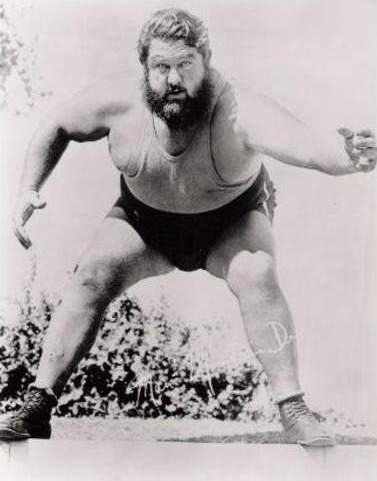
As an underaged youngster, Leavitt reportedly paid a New York street bum to impersonate his father so he could join the US Army on the eve of World War 1. He went on to be stationed in Texas, then fought with the US Army in France under General John Pershing.
After the war, those colorful chapters of his life that included football, police work, mobsters, professional wrestling, acting and top-secret service began playing out.
In 1921, he played football for the New York Brickley Giants in what would later become the NFL. In one game, he faced off against the legendary Jim Thorpe.
Later, with his enormous size – he was 5-11, and listed at 310 pounds – Leavitt tried his hand at professional wrestling, He reportedly loved the blend of athletics, theater and crowd interaction. Some of that may have been inherited from his father, who was a New York theater stage manager for the legendary Broadway producer George M. Cohan.
The Cop and Capone
After a fledgling start and laboring under a variety of identities, his schtick didn’t work and gigs dried up. So, he moved to Miami and joined the police force. That’s where he met his future wife, Dorris Dean, literally by accident when she bumped him with her car.
Shortly after, he was fired from the police force for “conduct unbecoming an officer” after he admitted making visits to the Miami home of frequent-Florida visitor and well-known Chicago mobster, Al Capone.
Newly married and jobless, the couple moved to Dorris’ home of Norcross, GA. Eventually the lure of wrestling brought him back to the ring, this time with a new manager and new name: Man Mountain Dean. Dorris encouraged the new name, concerned that his real last name – Leavitt – might sound “too Jewish” if he wrestled in Germany.
Dorris turned out to be more than a supportive wrestling wife. She also served as his business manager and booking agent. And, as described in the Tallahassee Democrat: “When opponents get too rough, she goes into the ring herself with chair, or water bucket, or whatever impromptu weapon comes handy.”
World Wide Fame
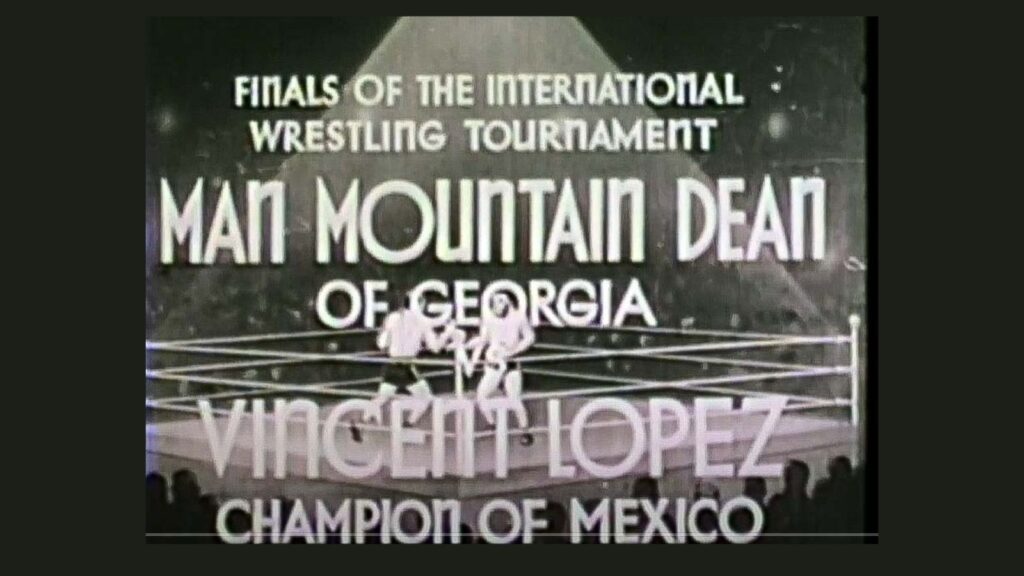
This time, Leavitt’s wrestling career as Man Mountain Dean took off. He became an international figure, traveling the country and world as a top-billed draw. He was immensely popular on the wrestling circuit (For a modern comparison, think Hulk Hogan, Ric Flair and The Undertaker).
He was getting rich, too. Mountain Man Dean commanded up to $1,500 for each appearance, which was higher than the average income in the US at that time in the 1930s. By the time his wrestling career ended due to a broken leg inflicted by a bitter and revenge-minded rival, Man Mountain Dean had appeared in nearly 7,000 matches.
Setting the future stage for wrestling stars like Dwayne “The Rock” Johnson and John Cena, he parlayed his wrestling fame into an acting career. From 1933 to 1938, he appeared in seven movies, then concluded his acting career in 1949 in the original “Mighty Joe Young.”
(To get a sense of Man Mountain’s acting and wrestling skills, check out this movie clip from the 1938 film, The Gladiator. Or, to see him in a “real” wrestling match, watch this YouTube video of a converted 16mm film from the 1935 International Wrestling Championships in Los Angeles.)
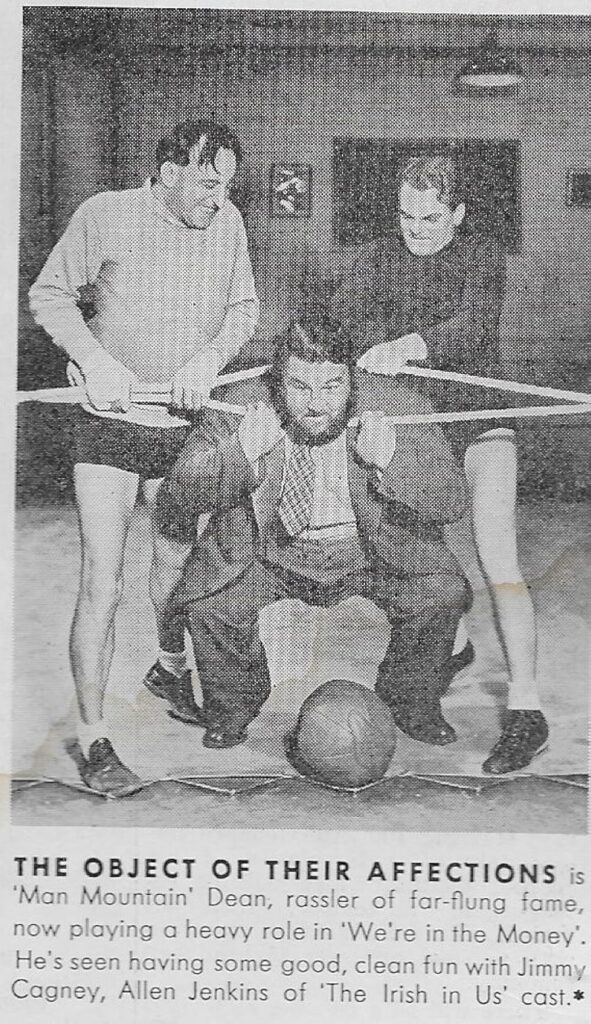
Home Again to Georgia
With his wrestling and acting careers mostly behind him due to that leg injury, the Leavitts returned to their Georgia home. In Norcross, Leavitt was an international man of leisure, literally living large. He liked performing feats of strength and stunts (like lifting cars), often driven by bets and dares from town folk. He ran for the state legislature and won, then resigned. He studied journalism. Plus, he refereed wrestling matches.
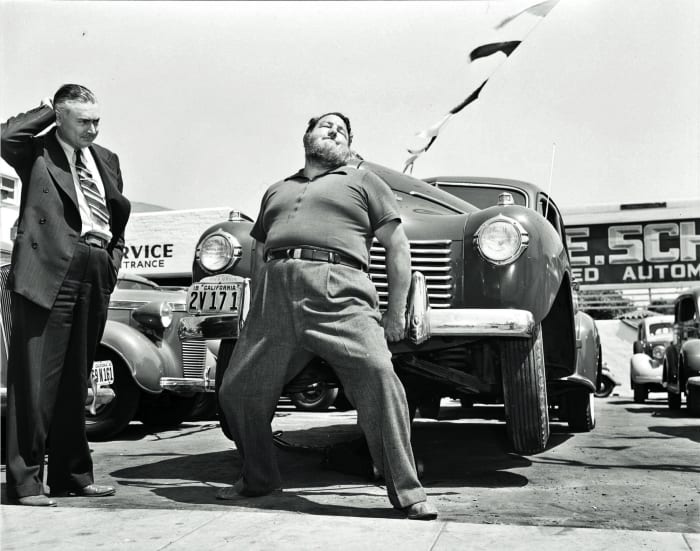
That is, until the Japanese attacked Pear Harbor on Dec. 7, 1941. Leavitt reportedly told a friend, “I know what I need to do,” then re-enlisted in the Army. Over 50 and with a body worn from football, wrestling and life, the Army didn’t quite know what to do with their newest mountain of a recruit. Then came an inspired and novel idea.
Leavitt was assigned to a former mountain retreat and resort, hidden in the Maryland countryside. It had been converted to a top-secret training camp. Today, a portion of that decommissioned camp is the presidential retreat, Camp David.
Spies and A Secret Mission
But in 1943, it was known as Camp Ritchie. The camp was secluded, and everything that happened there was top-secret and remained that way well into the 1950s, 60s and beyond. Thus, if you were to read the many well-documented accounts of Frank Leavitt’s life or his obituary from 1959, you would find no mention of his assignment or role there at Camp Ritchie. But based on declassification of some documents, the following is a summary. Some of this is documented in the book, Immigrant Soldier, by K. Lang-Slattery.
Recognizing the need for translators and culture experts, the US Army recruited recent European immigrants from Germany and other Axis countries to serve in a special unit assigned to Camp Ritchie. Many were German-born Jews who had fled Hitler’s terror. Most were well-educated, and reported for duty equipped with their musical instruments and books in addition to their Army-issued gear. Consistent with Europeans of the age, the recruits were slight of build, with an average height of five feet, four inches.
Eventually, many of the Immigrant Soldiers would be deployed not as translators working safely in offices front lines. Rather, they were developed into spies assigned to penetrate deep into their original Axis-controlled countries. With their local knowledge, average builds and American training, they were detailed to gather critical intelligence, occasionally perform commando tasks, and protect themselves – and their secrets – if discovered. They needed training in spy craft and self-defense, plus the kind of close quarters, hand-to-hand combat which might be required to carry out stealthy missions.
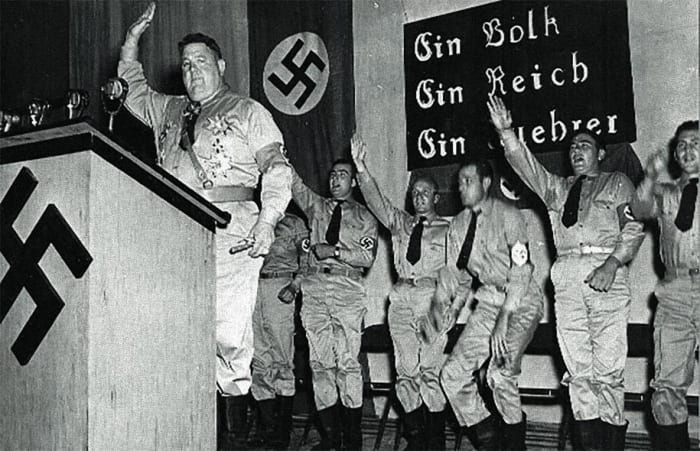
“The most important part of the training was that they learned to do interrogation of civilians and prisoners of war,” wrote David Frey, a history professor at West Point. “But they also did terrain analysis . . . photo analysis and aerial reconnaissance analysis. They did translation. They did night operations. They did counterintelligence.”
Despite the top-secret status and black outs on news, a rumor spread through Camp Ritchie: A famous American wrestler and celebrity would be coming to camp to teach the recruits hand-to-hand combat. And one day, a mountain of a man was spotted at camp, trying to jam himself into a phone booth.
Making an Entrance
Frank Simmons Leavitt, aka, Man Mountain Dean, had arrived at Camp Ritchie. With a gregarious personality borne of the theater and wrestling circuit, the Man Mountain was a force of nature in camp. Like he had done at home in Norcross, he welcomed challenges about his strength and skills, often putting on power and tactical demonstration on a bet or a whim. He regaled the European recruits with his wrestling adventures throughout Europe in locations that were familiar to them. He taught them American slang. And he put on what were described as “heroic eating demonstrations” worthy of his huge frame.

The Immigrant Soldiers and Americans stationed at Camp Ritchie were infatuated with Man Mountain Dean. And they quickly learned the range of his skills. Lang-Slattery wrote in her book that everyone “soon got over their awe of the huge and famous instructor. From him, they learned how to fight the enemy, individual against individual.”
License to Kill
With knowledge gained from wrestling and life – and some with untraceable origins – Leavitt was the camp’s specialist in hand-to-hand combat. Since the small Europeans didn’t have the Man Mountain’s size, it’s clear that his focus was on the use of close-in and intimate fighting techniques.
Lang-Slattery related the experience of Camp Ritchie graduate Gerd Grombacher. He credited Leavitt with teaching him how to kill an enemy at close quarters with a stiletto knife — “and how to make it so clean that it wouldn’t even hurt.”
Leavitt remained at Camp Ritchie through the end of the war. The recruits were shipped to Europe, and are credited with gaining an enormous quantity and high quality of critical intelligence, essential to the Allied battle plans and victory.
After the war ended, Leavitt returned to Norcross and the family farm. On May 29, 1953, Leavitt died of a heart attack while listening to a baseball game at his home.
Frank Simmons Leavitt is buried at Marietta National Cemetery in Section J, Site 9672-D.






